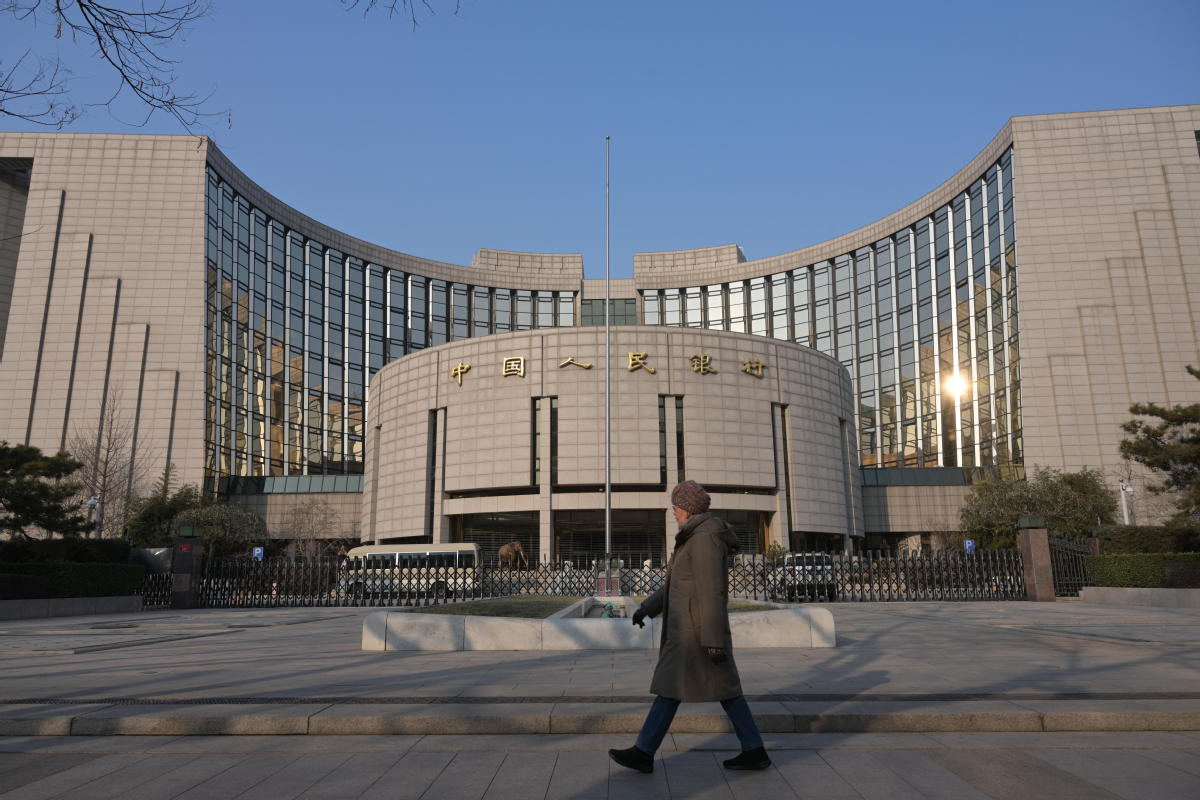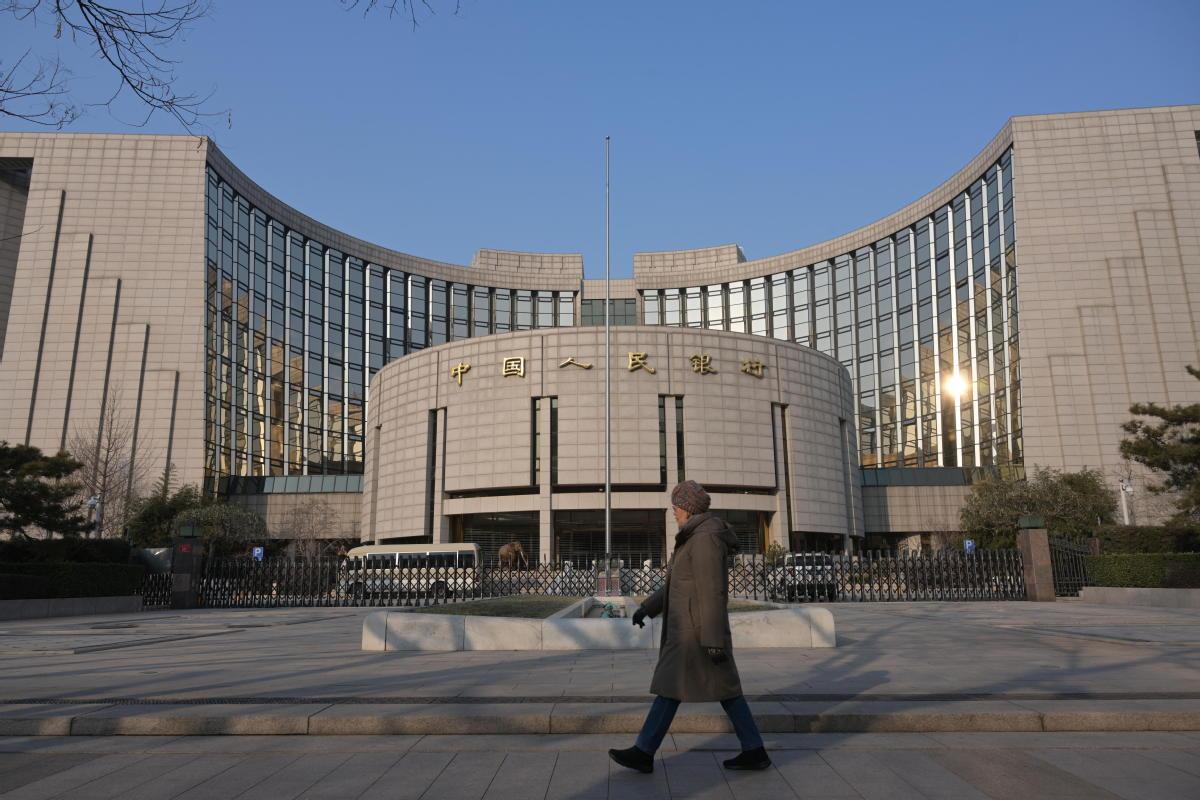
A pedestrian passes the headquarters of the People's Bank of China in Beijing. Photo by Zhang Gang/For China Daily)
BEIJING, Jan. 21 (Xinhua) -- China is expected to carry on the prudent monetary policy in a more flexible and precise way with rational and moderate control, and likely to maintain necessary support for economic recovery in the year of 2021, according to Chen Yulu, vice-governor of China's central bank People's Bank of China (PBOC), at the press conference of the Information Office of the State Council on January 15.
Chen added that the central bank will put maintaining economic stability on top priority and not make rash decisions, and decide the intensity, rhythm, and emphasis of monetary policy flexibly according to the characteristics of epidemic prevention and control and socioeconomic development at various stages.
--Monetary policy to be more reasonable and moderate
As for the tone of the monetary policy, the PBOC once again proposed "reasonable and moderate" at its annual conference. "A prudent monetary policy should be flexible, precise, reasonable, moderate, and sustainable," said Sun Guofeng, head of the monetary policy department at the PBOC.
"Reasonable and moderate" refers to the control of financial support for economy, which is embodied through the sizes of money supply and social financing, said Chen Yulu, adding that China will make sure money supply growth and the size of social financing match the nominal economic growth, to support further economic recovery and high-quality development via moderate monetary growth.
Chen added that the growth of the broad money supply, namely M2 and the size of social financing could be slightly higher or lower than the nominal economic growth according to the economic situations, to reflect the counter-cyclic adjustment in medium to long term monetary policy.
The current economy in China has returned to a potential output level, with a strong demand for business loans and a reasonable growth in currency credit, indicating that the current interest rate level is appropriate, said Sun Guofeng.
Sun added that the deposit reserve ration in China is not high with the average deposit reserve ratio for Chinese financial institutions standing at 9.4 percent, while for over 4,000 medium and small sized depository financial institutions, the ratio is 6 percent.
--Improve financial resource allocation
As for improvement of the mix in loan portfolios, the outstanding balance of medium and long-term loans to the manufacturing sector kept growing for 14 consecutive months and surged by 35.2 percent on year by the end of 2020, 20.3 percentage points higher than the same period of 2019.
Inclusive loans to small and micro companies grew by 30.3 percent in 2020, 7.2 percentage points higher than the previous year. Additionally, the financial policy to curb housing prices gradually took effect, and the growth in the outstanding balance of loans to the real estate sector fell for 29 consecutive months.
According to Chen Yulu, the central bank will maintain the continuity, stability, and sustainability of monetary policies, continue to make good use of structural monetary policy instruments and targeted credit policies, and further strengthen support for small and micro-enterprises.
As for implementing long-term mechanisms for the real estate market, Zou Lan, head of the financial market department at the PBOC said that the central bank has guided the financial administrations to strengthen the monitoring and calculating of all funds flowing into real estate, allowed commercial banks to increase real estate loans at a reasonable speed, and promoted the flow of financial resources into major sectors.
In 2020, the growth rate of real estate loans was lower than that of other loans for the first time in eight years. The proportion of the newly added real estate loans in all loans fell from the 44.8 percent in 2016 to 28 percent last year, said Zou.
The PBOC will take the lead in improving financial policies for housing rentals. Focusing on both housing purchases and renting, the PBOC will accelerate the study of financial policies to support the housing rental market, and solicit public opinions in the days to come, added Zou.
Reducing financing costs is an important chain to make people benefit more from financial resources. At the end of 2020, the weighted average interest rate on enterprise loans in China was 4.61 percent, 0.51 percentage point lower than that in the same period in 2019, said Chen Yulu, adding that China's financial institutions achieved the goal of saving enterprises 1.5 trillion yuan to boost the real economy in 2020.
As for promotion of the decline in corporate financing costs, Sun expressed, the PBOC will deepen reform toward a more market-oriented interest rate, deepen LPR reform, consolidate achievements via the reduction of real interest rate on loans, and promote the steady decline of corporate financing costs.
---Prevent risks and safeguard financial stability
Chen Yulu said that China has made phased achievements in preventing and defusing financial risks, for example, all Peer to Peer Lending (P2P) platforms have been removed, high-risk financial institutions have been orderly disposed, and the risks of asset management products have been significantly converged.
As for strict prevention of external financial risks, Chen said, volatility or fluctuations in cross-border capital flow accelerates against a background of highly relaxed global liquidity. The PBOC will improve the financial monitoring system and enhance the ability of macro-prudential management as well as the ability of systematic risk prevention and control.
As for forecast of the price index this year, in general, the price level in China will see a moderate rise in 2021. It is predicted that the year-on-year growth of the CPI this year will rise first and then stabilize, according to Chen Yulu.
While paying attention to the price level, the central bank pays more attention to asset prices in important sectors. To effectively safeguard financial stability, the central bank has implemented macro-prudential policies to guard against macro-financial risks caused by sharp fluctuations in asset prices, said Chen Yulu.
(Edited by Jiang Feifan with Xinhua Silk Road, 346129473@qq.com)




 A single purchase
A single purchase









